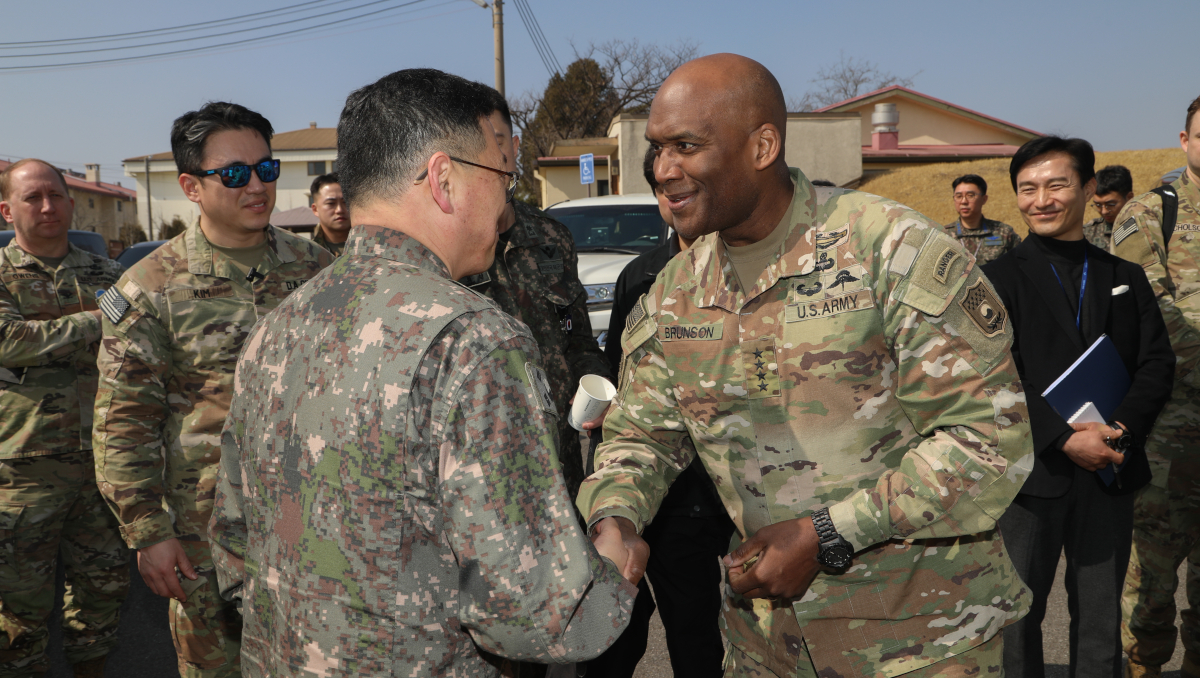
In May 2025, the U.S. Army War College hosted its fourth annual Strategic Landpower Symposium. The event featured General Xavier Brunson, commander of United Nations Command, ROK/U.S. Combined Forces Command and U.S. Forces Korea, as the keynote speaker. In a discussion with host Tom Spahr, General Brunson shared insights into his demanding role and the critical strategic importance of the Korean Peninsula. He underscored the necessity of reviving the “emotion” that motivated international support for South Korea during the Korean War. General Brunson also emphasized the delicate balance between maintaining a “fight tonight” readiness and continuously modernizing forces to counter advancements in North Korean and Chinese military technology.
Our adversaries are doing things that we’ve already done. And we have to continue to mature our relationships in such a way that we maintain our competitive advantage, which is our network of friends, partners, and allies. Maintaining that is critically important in the future.
Podcast: Download
Xavier Brunson is a U.S. Army general who has served as the commander of United Nations Command, ROK/U.S. Combined Forces Command and U.S. Forces Korea since 20 December 2024. Previously he served as the commanding general of I Corps from 2021 to 2024.
Thomas W. Spahr is the DeSerio Chair of Strategic and Theater Intelligence at the U.S. Army War College. He is a retired colonel in the U.S. Army and holds a Ph.D. in History from The Ohio State University. He teaches courses at the Army War College on Military Campaigning and Intelligence.
The views expressed in this presentation are those of the speakers and do not necessarily reflect those of the U.S. Army War College, U.S. Army, or Department of Defense.
Photo Description: Gen. Xavier T. Brunson, United Nations Command, Combined Forces Command, and United States Forces Korea Commanding General, and Republic of Korea Army Brig. Gen. Won-Jun Cha, Commander of Combined Military Information Support Operation Component Command, exchange coins following Brunson’s visit to CMISOCC Headquarters, March 1, 2025 on Camp Humphreys. Brunson’s visit was part of a battlefield circulation in conjunction with Freedom Shield 25, where he witnessed military information support operations capabilities firsthand, and discussed the importance of strategic messaging, and leveraging MISO as a force multiplier in the battle space.
Photo Credit: U.S. Army Photo by Staff Sgt. Ian Vega-Cerezo, UNC/CFC/USFK Public Affairs





Beginning at about the 23:00 of this podcast, there is a discussion relating to a main job of “four stars” being to “manage risk.”
As to that such important topic and primary responsibility, how should we say that the recent moves by the U.S., and other important nations, to embrace such things as an alternative (generally illiberal) normative system, and to embrace such things as a (broadly multipolar) vision of international order — how should we say that these such moves have effected (if at all):
a. The ability of “four stars” to manage risk? And:
b. These “four stars” need to — and/or ability to — employ “land power?”
Likewise, how might we say that these such moves (see my initial comment immediately above) have effected (if at all) such things as “our,” and “their,” readiness needs — and “our,” and “their,” alliances, and alliance needs?
Note that, from the perspective that I provide above (all the great powers today, to include the U.S. now also, in addition to many of the lesser powers, all seem to have embraced the idea of such things as [a] a generally illiberal normative system and such things as [b] a broadly multipolar vision of international order);
Note that, from that such “we are all on the same sheet of music now” perspective, we, in 2025, would seem to be (a) in much the same place that we were at the end of the Cold War (nearly everyone agreeing as to what was the normative system and what was the international order) but, in this case, with the authoritarian entities “winning” this time?